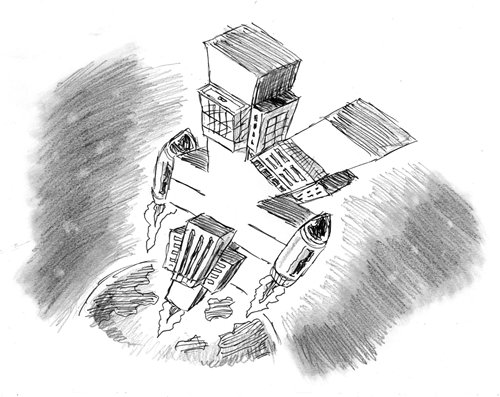
Illustration: Peter C. Espina/GT
Editor's Note:
Known as "the cannon" for the bluntness and fierceness of his comments, Ren Zhiqiang, the former chairman of board of Beijing Huayuan Group, claimed at a real estate forum on Sunday that housing prices in China will rise further, a comment that set off a controversy. Here are his comments on some hot property topics.
On property sales in 2017
Among various indicators measuring the property sector, it is crucial to pay attention to changes in land supply and new construction starts, which reflect expectations for the market. As for property sales of this year, it is generally believed that micro- and macro-control measures will have a negative impact on the real estate market, but judging from the current situation, I think home sales will record new highs in terms of both area and value in 2017. Even growth of just 1 percent or 2 percent will be enough to push home sales to a new high this year.
If the real estate market records another new high, how can we say that the market is bad? If someone believes that the golden age has passed, can they say why property sales continue to grow?
On housing price trends
With the allocation of land resources determined by the government, China's real estate market is unlikely to see any fundamental change.
Statistics for the second quarter of this year indicate that China's land transfer prices are actually rising. Although many cities have taken measures to curb soaring housing prices, there have been no policies to keep land transfer prices from rising. Land transfer prices continued to climb in the second quarter, which will surely affect the housing market.
Therefore, as high land prices eventually lead to higher housing prices, it is unlikely that home prices will plunge or even collapse, so long as land prices rise.
On easing housing control policies
Regulators may unwind housing controls if there is a rapid decline in the property market or volatile economic conditions, or when a huge change happens in the real economy. During the first half of this year, real estate-related tax revenues showed a remarkable increase, with deed tax and capital gains tax up sharply by 18.5 percent and 23.9 percent, respectively. Taking these factors into account, only if there is an economic downturn, especially if it is due to a liquidity shortage, might the government relax real estate policies.
On the apartment rental market
Many cities, especially some large ones, want to promote their home rental markets. But without a subsidized home rental market, the property market - as it is based on high land transfer prices - will only mean high rents. China's home rental market has a history of more than a decade, but its existence hasn't helped rein in property prices.
On property developers' debt
From January to May, the 107 Chinese property developers that are listed on stock exchanges experienced a considerable fall in their financing, with bank loans, bond issues and other financing sources decreasing continuously. New debt of these developers reached 852 billion yuan ($126 billion) from 2015-16, compared with only 820 billion yuan from 2010-14.
These figures indicate that developers are soon facing a peak period for debt repayment. It is estimated that these property developers will need to repay more than 330 billion yuan next year and at least 400 billion yuan in 2019. More than 1 trillion yuan of their debt will mature from 2017-19. Regulatory control of credit is directly related to their financing, which will have a great impact on their debt issues.
In the months and years to come, national housing policies, macroeconomic policies and microeconomic policies may lead to cash flow difficulties for some developers, given the constraints on financing. In that case, the peak period for debt repayment may affect some developers over a longer period of time.




